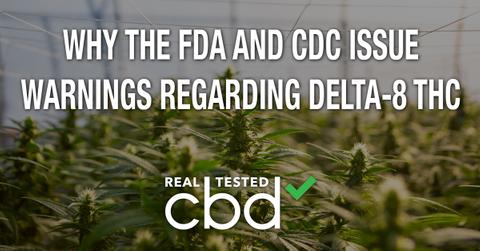Why The FDA and CDC Issue Warnings Regarding Delta-8 THC

Oct. 28 2021, Published 2:16 p.m. ET
The U.S. Food and Drug Administration and the Centers for Disease Control and Prevention issued warnings on September 14, regarding potential risks of delta-8 THC.
The warnings came as delta-8 THC is gaining rapid popularity among cannabis and hemp consumers alike. Delta-8 is a cousin of traditional THC (delta-9 THC) and has similar properties but is typically crafted from hemp plants. The 2018 Farm Bill created somewhat of a grey area for the cannabinoid, which is now seeing regulations on the rise.
The FDA and CDC set forth warnings on the potentially adverse impacts of delta-8 for some users, further solidifying the need for third-party lab testing.
What Is Delta-8?
Delta-8 THC occurs in all cannabis and hemp plants in very small concentrations, with most of the delta-8 THC available being produced from hemp plants. Delta-8 THC is a relative of delta-9 THC, with a similar molecular structure, but with a few notable differences. The two share similar properties, like potentially stimulating appetite or reducing pain, but Delta-8 THC reportedly exhibits a lower psychoactive impact than Delta-9 THC.
From a chemical standpoint, delta-8 THC and delta-9 THC differ due to the location of a double bind in their molecular chain. Delta-8 THC contains the bond on the 8thcarbon chain while delta-9 THC has it on the 9thcarbon chain. Though this is a small difference in structure, there is a detectable difference in how each effects the body’s endocannabinoid system (ECS). Delta-8 THC can bind to CB1 receptors within the ECS, but less is known about the bonding with CB2 receptors.
FDA and CDC Warnings
In the latest consumer update from the CDC and FDA begins with warnings about the increased availability of delta-8 products across the U.S. Due to the labeling on some delta-8 products, consumers may not be fully aware of the ingredients in the product they are purchasing. Turning to third-party lab test results that are fully transparent and clearly marked is key.
The CDC stated that though delta-8 products are becoming more readily available, the regulation and research surrounding the new cannabinoid is still limited. Many delta-8 THC products are labeled as containing only the isomer of delta-9 without mention of traditional THC. This could lead to unwanted effects for unassuming users.
Delta-8 THC and delta-9 reportedly have similar effects, with a decreased psychoactive aspect for delta-8. The concerns of the FDA and CDC center primarily on other cannabinoid and terpene content that could be present in delta-8 products without making it onto a product label. Finding companies that are fully transparent in their product and labeling is needed throughout the hemp and cannabis industries to ensure proper regulation and growth.
The FDA has stated they are working directly with federal and state governments to address and regulate concerns related to delta-8 THC. As more regulations across various state’s arise, we here at Real Tested CBD will keep you up to date on the latest legislation. Check here for our full D8 Resource Page, and check here for our list of tested and tried delta-8 products.



